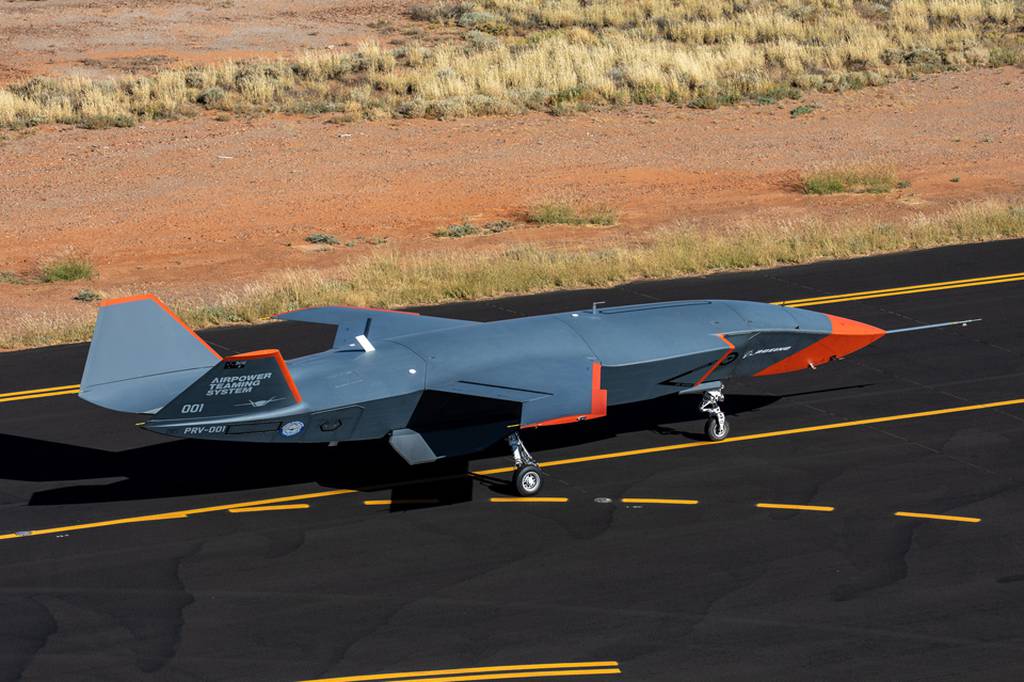
FARNBOROUGH AIR SHOW — A top Boeing executive said Monday the company plans to keep bidding to make drone wingmen for the Air Force — but not if it means agreeing to a fixed-price contract.
“If it’s a fixed-price development program that requires a ton of maturity … that is a recipe for failure,” Ted Colbert, president and chief executive at Boeing Defense, Space and Security, told reporters at the Farnborough Air Show in England. “It really is. The stuff that we do is really hard, and we’ve got to set ourselves up for success.”
The Air Force wants to create a fleet of autonomous drones known as Collaborative Combat Aircraft to fly alongside F-35s and the future Next Generation Air Dominance fighter. The service is now planning to create a fleet of about 1,000 CCAs to carry out a variety of missions including conducting airstrikes, jamming enemy signals, gathering intelligence, surveillance and reconnaissance, and serving as decoys in combat.
In April, the Air Force awarded contracts to Anduril and General Atomics to design and build the first round of CCAs. A second wave, or as the Air Force calls it, “Increment 2,” will follow, and Boeing plans to bid on it unless it means agreeing to a fixed-price contract.
Under a fixed-price contract, a company agrees to create a system for the military at a set price tag. If the program busts its budget, the company is on the hook for cost overruns.
Boeing has ended up taking billions of dollars in losses on fixed price deals for programs like the KC-46 Pegasus refueling tanker. In an October 2023 earnings call, Boeing chief financial officer Brian West told investors the company has not signed any further fixed-price development contracts, “nor [do we] intend to.”
Boeing’s newfound reluctance to agreeing to fixed-price contracts showed up late last year, when the company was disqualified from the contest to build the replacement for the E-4B Nightwatch “doomsday plane.”
Colbert said the deal to build the Survivable Airborne Operations Center would have entailed agreeing to fixed-price elements and other components that were unacceptable to Boeing. Sierra Nevada Corp. ultimately received the deal to build SAOC for the Air Force.
“We submitted a proposal on that … but we were disqualified,” Colbert said. “And that was it. … There were dimensions of that, that we just cannot sign up for. Especially given the complexity of that particular system.”
And when a program involves “immature technology” or a system that is among the first of its kind, such as CCAs, Colbert said Boeing will need to protect its own interests.
“This isn’t meant to be an adversarial comment,” Colbert said. “It’s about doing it right together with our customer. It’s about us acknowledging that these programs are really tough in the early years.”
Boeing’s work on the MQ-28 Ghost Bat, an autonomous drone primarily flown by the Royal Australian Air Force, and the MQ-25 Stingray autonomous drone refueler has laid the groundwork for more work on the CCA program, Colbert said.
Colbert predicted the Air Force’s future fleet of CCAs will be made up of a variety of different drones.
“Kind of like your families of car models,” Colbert said. “Small, medium, large, attritable, lethal. That whole market is set up for a lot of competition going forward, and we’re investing to make sure that we can compete in that market.”
Author: Stephen Losey
Source: DefenseNews



